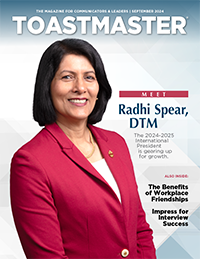
As I began my Toastmasters Leadership Institute (TLI) workshop on using clown techniques for better speeches, my participants were scared! “But I’m terrified of clowns,” one woman exclaimed. But once they started practicing these techniques, they found themselves connecting with their audience like never before (and falling out of their chairs with laughter).
So fellow Toastmasters, let me relieve you of your coulrophobia (the fear of clowns). We’re not talking about the red-nosed character you’re imagining from pop culture. We’re talking about “clown presence”: a way of presenting that incorporates fun in an authentic, mutual, and joyful way. Related to “affiliative humor,” this state celebrates inclusivity and finds laughter in shared experiences. I learned this secret to audience connection as a Blue Man Group performer and professional touring clown, and now I use it as a trainer, coach, and professional speaker for Fortune 500 companies around the world. Stepping into your own clown presence will allow you to find laughter in your speeches through an authentic connection with your audience.
In this Toastmasters Podcast episode, learn how to tap into your clown presence with professional speaker and performer Don Colliver.
Connect With a Wink
The clown does not exist without the audience, just like a Toastmaster. Sure, you practice in front of your mirror at home, but your speech truly comes alive in that magical connection with your fellow members in your club. Learning to play with this two-way connection is the key to adding this kind of humor to your presentations.
The clown term for this playfulness is clin d’œil (pronounced clahn-doi), the French word for wink. This “twinkle in your eye” communicates that “I know this idea is silly. You know this idea is silly. We both know that each other knows this idea is silly. Therefore, we can have fun and not take this idea too seriously.” Embodying this state says “we’re all in this together” and encourages a feeling of belonging and inclusivity, opening the door to a deeper understanding of your message. So how do you add a wink to your speeches? Here are three easy techniques for incorporating inclusive clown humor into your next presentation.
1 Familiar Is Funny
Since humor relies on a shared experience, always learn some basic background about your audience to find what you have in common: age range, hobbies, experience with your topic, cultural background, etc. Use this information to create audience-specific opportunities for laughs.
For example, my audience knowledge helped me win the District 1 Tall Tales Speech Contest with my speech “Matt the I.T. Guy.” Since District 1 contains the greater Los Angeles area, I knew my audience would relate to traffic, so I structured my wacky story around the exits of LA’s vehicle-choked 405 freeway. The laughs of understanding were thunderous!
Your Turn
Use this concept at your club by referencing a shared Toastmasters experience, like the challenges of filling weekly meeting roles or following up on upcoming deadlines. You could reference this shared experience to playfully illustrate a point in your speech. Suppose you’re delivering a presentation explaining how your high-stakes product manager job involves coordinating many busy stakeholders and extremely complex delivery schedules. To add some familiar “funny-ness,” you could playfully suggest that your job is similar to trying to get meeting roles filled each week. Even though you and your audience know that this is not truly a valid comparison, you’re using a metaphorical wink that allows you to use this shared experience to connect with your audience, illustrate your point, and have some fun.
2 Own Your Groan
Dealing with our own personal foibles is something to which every human on Earth can relate. “Ugh, I wish I exercised more! Am I right?” Since the safest target for humor is always yourself, your own human imperfections are fair game. While you should never make fun of your audience, showing the confidence to laugh at your own minor imperfections allows your audience to relate to your humanity.
Your Turn
Many stand-up comedy sets begin with this technique of the comedian poking fun at something specific about their own physical appearance, and you can do the same. For example, some Toastmasters have said I bear a slight resemblance to an amped-up Jim Carrey, the Hollywood comedic actor. I could “own my groan” at the beginning of my speech by saying, “I know what you’re thinking, folks. I look like Jim Carrey after two pots of coffee.”
Finding your own clown presence will allow you to incorporate good-natured fun in your presentations in an inclusive, connecting, and hilarious way.
Another way to own your groan is by delivering a “dad joke,” which is typically a pun or inoffensive, corny joke used by a father that might embarrass his children. For example, “Why is no one friends with Dracula? Because he’s a pain in the neck.” These groaners are clearly not intended to elicit an authentic laugh from the actual joke content. Instead, dad jokes receive giggles because the joke teller is willing to be the focus of the laughter. Being willing to own these groans can get your audience on your side by showing that you’re confident and comfortable enough to connect with them by having some fun at your own expense. A simple internet search will reward you with pages of dad jokes related to your topic (and plenty of eye rolls).
3 Play With Pattern
At its most basic level, humor occurs when a pattern or expectation is disrupted in a surprising way. Take the classic Groucho Marx joke from the 1930 Marx Brothers film Animal Crackers: “One morning, I shot an elephant in my pajamas. How he got in my pajamas, I don’t know.” The expectation created in the first line, or “setup,” is that Groucho shot an elephant while Groucho himself wore pajamas. The second line, or “punch line,” surprisingly breaks that expectation by revealing that the elephant was actually the one wearing Groucho’s pajamas. The expectation has been disrupted in a surprising way. Laughter ensues. And Groucho needs new pajamas.
Your Turn
You can use this method of creating and disrupting a pattern to add humor to your speeches by utilizing comedy’s classic Rule of Three. A sequence of three ideas is the quickest way to build and then break a pattern. The Rule of Three consists of reciting a list of three related ideas. The first two ideas set up a pattern and then the third idea breaks that pattern with a surprising and ridiculous exaggeration.
For example, you could explain your penchant for sweets in an Ice Breaker speech by reciting a list of three of your favorite treats. The first two could be actual candy products, creating an expectation that the pattern will continue with a similar tempting snack, which you will, of course, disrupt. “I really love sweets. I enjoy Oreo cookies, Snickers candy bars, and the occasional 2-pound bag of Domino Cane Sugar.” Breaking that expectation by using a ridiculous exaggeration as the third idea will often get a laugh from your audience.
I hope these tips help you add some humor and audience connection to your speeches. I also hope you’ve lost a bit of your trepidation toward our red-nosed friends! Finding your own clown presence will allow you to incorporate good-natured fun in your presentations in an inclusive, connecting, and hilarious way. So be funny! Your audience will appreciate it.
Don Colliver is a world-renowned keynote speaker and bestselling author living in the San Francisco Bay area of California. He recently released the book Wink: Transforming Public Speaking with Clown Presence. Reach him at winkpublicspeaking.com.





